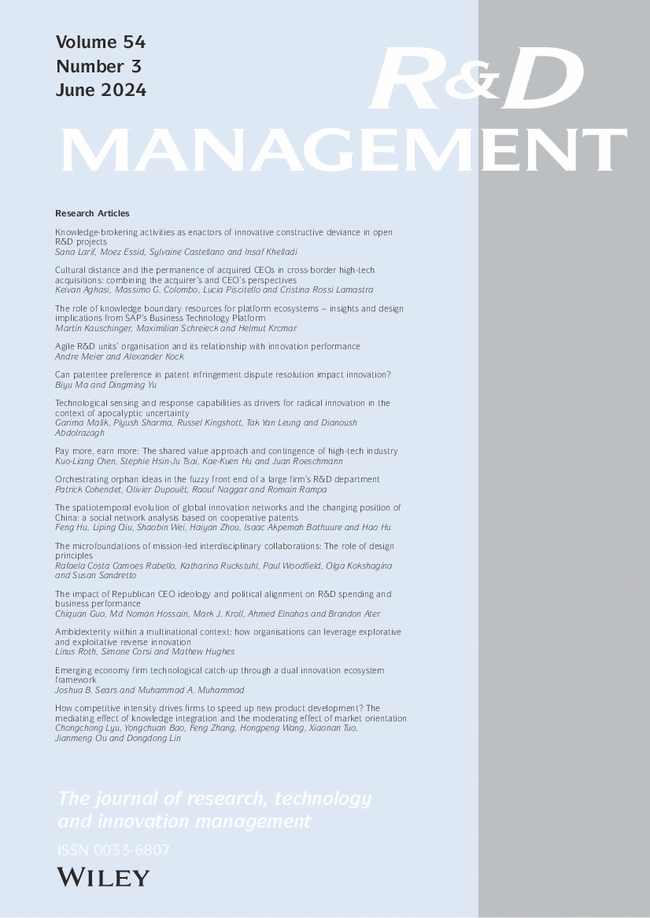Science‐based innovation via university spin‐offs: the influence of intangible assets
IF 5.7
2区 管理学
Q1 BUSINESS
引用次数: 0
Abstract
University spin‐offs (USOs) have attracted significant attention from scholars and policymakers as an important mechanism for science‐based innovation. The debate on how USOs generate innovation outcomes has often focused on tangible assets, while the role of intangible assets has been less explored and remains loosely defined. Yet emerging research suggests that intangible assets, especially in the early stages of a USO's lifecycle, have a critical influence on its survival and future success, highlighting a need for a better understanding of how intangible assets enable science‐based innovation through USOs. Drawing from several streams of literature, we define intangible assets in the context of science‐based innovation through USOs: an intangible asset is a resource that is non‐physical, non‐financial, has long life, and has potential to provide future benefits to the owner. Based on this working definition, we conduct a systematic literature review of the leading innovation management journals and inductively derive a framework outlining the antecedents, processes, and outcomes of science‐based innovation through USOs, focusing on the influence of intangible assets. The framework identifies the categories of resources which can enhance or hinder science‐based innovation through USOs. Such categorization reveals fruitful directions for future research such as a deeper examination of societal outcomes. We conclude by offering recommendations for scholars, practitioners, and policymakers to better leverage intangible assets to enhance science‐based innovation.基于科学的大学衍生创新:无形资产的影响
大学分拆作为一种重要的科学创新机制,已经引起了学者和政策制定者的广泛关注。关于uso如何产生创新成果的争论往往集中在有形资产上,而无形资产的作用却很少被探索,而且仍然是松散的定义。然而,新兴研究表明,无形资产,特别是在USO生命周期的早期阶段,对其生存和未来的成功有着至关重要的影响,这突出了我们需要更好地理解无形资产如何通过USO实现基于科学的创新。根据多种文献,我们通过uso在基于科学的创新背景下定义了无形资产:无形资产是一种非物质、非金融、寿命长、并有可能为所有者提供未来利益的资源。基于这一工作定义,我们对领先的创新管理期刊进行了系统的文献综述,并归纳出一个框架,概述了通过USOs进行科学创新的前提、过程和结果,重点关注无形资产的影响。该框架确定了可以通过uso促进或阻碍基于科学的创新的资源类别。这种分类为未来的研究揭示了富有成效的方向,例如对社会结果的更深入的研究。最后,我们为学者、从业者和政策制定者提供了建议,以更好地利用无形资产来促进基于科学的创新。
本文章由计算机程序翻译,如有差异,请以英文原文为准。
求助全文
约1分钟内获得全文
求助全文
来源期刊

R&D Management
Multiple-
CiteScore
11.30
自引率
9.50%
发文量
0
期刊介绍:
R&D Management journal publishes articles which address the interests of both practising managers and academic researchers in research and development and innovation management. Covering the full range of topics in research, development, design and innovation, and related strategic and human resource issues - from exploratory science to commercial exploitation - articles also examine social, economic and environmental implications.
 求助内容:
求助内容: 应助结果提醒方式:
应助结果提醒方式:


